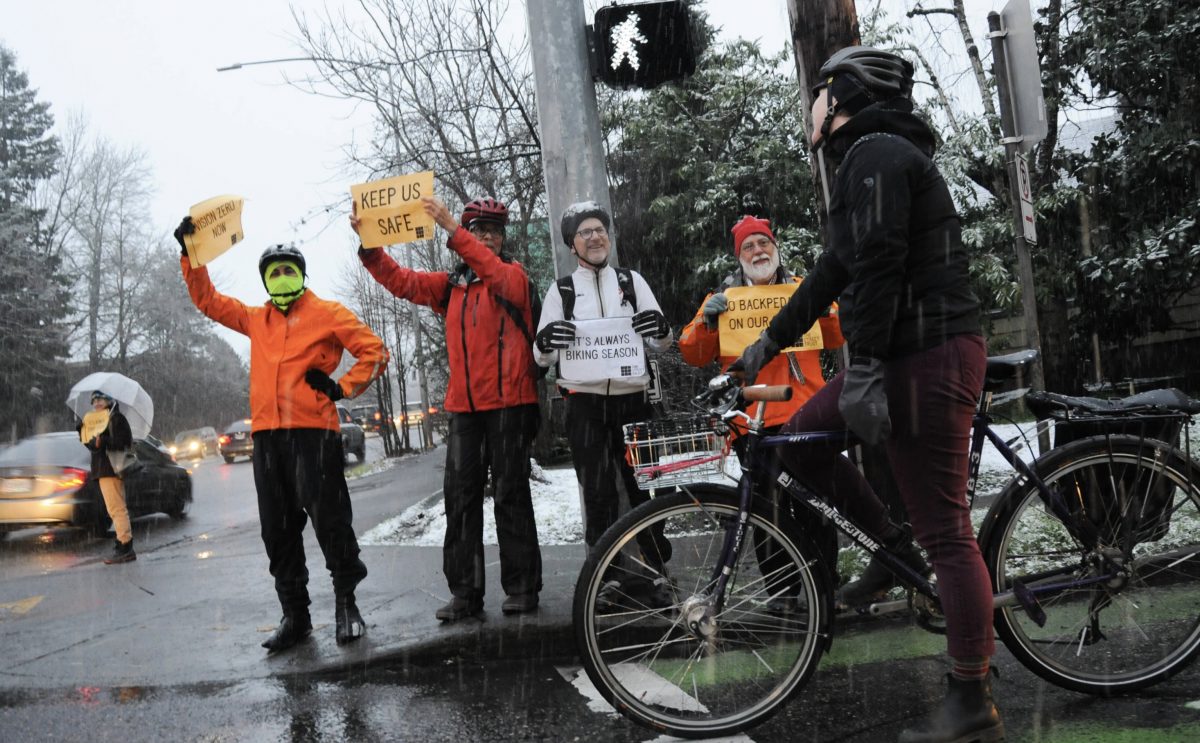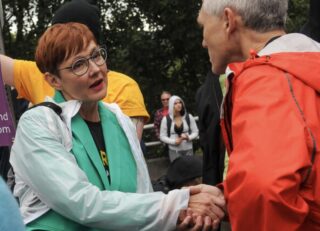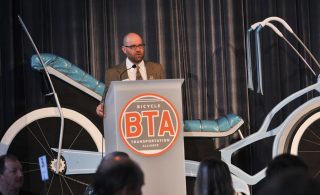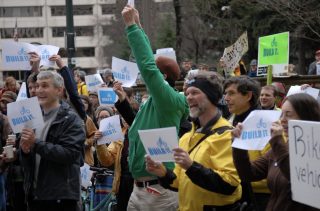
(Photos: Jonathan Maus/BikePortland)
“What we’ve got is a very lived-in new logo and name but we haven’t really built the organization backup behind that.”
— Sarah Iannarone, The Street Trust
The announcement Friday that The Street Trust is hiring four new, full-time staffers marked what could be an exciting new era for the nonprofit formerly known as the Bicycle Transportation Alliance.
The job postings come as the organization is about to share a new strategic plan that will guide the work of both their 501 c3 nonprofit advocacy and their 501 c4 political action committee. It will be the first major initiative of new Interim Executive Director Sarah Iannarone, the former mayoral candidate hired in January with the hope she could do for regional transportation advocacy what she did in her impressive 2020 political campaign.
And The Street Trust desperately needs her help. Turnover is common for small nonprofits, and the pandemic levied a big toll. But The Street Trust’s issues started long before the onset of Covid. Iannarone is the fourth leader of the organization in the last five years. Around the time the organization changed their name in 2016 they had about 15 full time staff. Today they’re down to just three (including Iannarone), and only one who’s been there more than six months.
Advertisement

In 2017 we shared the daunting road ahead for the organization. Four years later, they have a route to guide them down it.

“The Street Trust is building a new team as we prepare to publicly unveil our new Strategic Action Plan – a roadmap to how we intend to win the future of transportation,” reads the optimistic blurb that accompanies the job listings. The strategic plan itself hasn’t been released, but the jobs give us clues about how the new Street Trust will be structured. There are immediate openings for managers of “partnerships”, “member voice”, “grants and impacts”, and “policy transformation”. Each new job aligns directly with one of the group’s four strategic goals.
In an interview this week, Iannarone explained how the organization’s name change impacted its evolution. An everyday rider herself, Iannarone is one of Portland’s most effective cycling advocates. She’s a member of the City of Portland’s Bicycle Advisory Committee and she represents bicycling on the budget advisory committee for the transportation bureau (a position she held before being hired by The Street Trust).
“I’m as pro-cycling as it gets,” she shared in our conversation. “But what I know is that in this new model, we have to think about the whole community… We have to think beyond cyclists.” In Iannarone’s view, taking “Bicycle” out of the organization’s name was a necessary step; but it hurt The Street Trust because they didn’t communicate their intentions well to their existing audience of bicycle lovers. “I think that what happened was they lost some people without building up the people who hadn’t been there before.”
In other words, they alienated people who identify as “cyclists” and hadn’t built up the non-cycling parts of their work. “So what we’ve got is a very lived-in new logo and name but we haven’t really built the organization backup behind that,” is how Iannarone explained it. “This work that I’m doing right now should have probably been done then right? If you’re going to shift over to an organization called ‘The Street Trust’ you can’t just change your name. And you can’t just change your values either.”
Advertisement
“Advocating for an all mode solution, didn’t mean that cyclists, didn’t matter. It just meant that they weren’t the only ones who mattered in this streetscape, anymore.”
— Sarah Iannarone
Iannarone’s perspective is informed by about 60 interviews she had with various stakeholders to learn more about the past and present of the organization. Most of them were “pretty critical”. “I talked with one legislator who said, ‘It just makes me sad to see you not having impact. You’ve got 30 years of advocacy under your belt, why aren’t you having an impact?’ So not squandering that would be pretty important.”
With those voices in her head, Iannarone knows she needs to shore up the organization’s brand not just among local bike riders, but in city hall and Salem offices as well. To do that, she plans to couple the new strategic plan with a communications plan to make sure it’s properly cemented in hearts and minds.
One of the challenges will be to set expectations in the community about what type of work The Street Trust will do. And that it won’t be just about bikes — or any one mode for that matter.
“We made it less about the mode you choose, and more about the outcome,” Iannarone explained. “So when someone says to me, ‘Hey Sarah, are you going to get behind this thing or that thing?’ I’m going to be like: Does it make the streets safer? Is our is our transportation system more accessible and equitable? Are we realizing climate justice?”
Iannarone added that she wanted to make it very clear that, “Advocating for an all mode solution, didn’t mean that cyclists, didn’t matter. It just meant that they weren’t the only ones who mattered in this streetscape, anymore.”

The trick about not being cycling-centric, I replied, is that cycling is a mode of transportation that people very strongly identify with. There’s also a deep historical legacy of bike advocacy, bike advocates, bike culture, and so on. How does an organization capitalize on that cycling magic, while also deprioritizing it?
“That so-called ‘cycling magic’ didn’t happen overnight,” Iannarone answered:
“That was 30 years of advocacy. You had very powerful people like Rex Burkholder and Earl Blumenauer who were able to use their privilege in their position in society to advocate for something that they were passionate about. Where are the champions today using their privilege and their position in society to advocate for what they’re passionate about? I do that. I’ve always been multimodal as long as people have heard about me right? And when I talk about ‘safe streets’ I’m talking about for people moving through them, or sitting on the side of them. And I think that’s one of the reasons why this is a perfect perch for me in the moment; because I can bring that passion and that clarity around why the streets are such a treasure to us and why I care so much about this complete streets model.”
For Iannarone, it’s not just about complete streets, it’s about a complete community. She sees her work as building a new foundation for cycling and transportation advocacy, made up of new faces and voices that will create their own legacy. One that looks a lot different than the one Portland is known for.
One reason for bicycling’s plateau in Portland, in her view, is that a large swath of the city hasn’t been heard from enough. As a former east Portland resident, she knows people who live in that area of town have zero connection to Portland’s reputation as a transportation leader. “They don’t even have streetlights there. TriMet stops are in a ditch, right? So what does it mean for them to see themselves in the Portland transportation story?”
Building a broader movement that looks different than the grey-haired, white faces and hi-viz jackets of past BTA/STreet Trust rallies will be a top priority in the new plan. Speaking of rallies, one of the sources of heartburn about The Street Trust in recent years is how they no longer hold them. Bike Loud PDX launched in 2014 precisely because The Street Trust has gotten so conservative over the years and Portlanders wanted a more aggressive voice for bicycling.
Advertisement

Power in suits and on the streets are both vital to the advocacy ecosystem, and Iannarone said she’ll look to build partnerships to keep that ecosystem healthy. The Street Trust has offered to be the fiscal sponsor of smaller groups like Bike Loud and Families for Safe Streets. Instead of showing up at an intersection, The Street Trust will stay in the background and provide support for groups that do. “I don’t think you can be all things to all people. I think you’ve got to do what you do best.” For The Street Trust that means keeping a laser focus on politics and the policy sausage-making.
How would that play out in a real-world example? Like the controversial Hawthorne Pave & Paint project? I asked Iannarone how The Street Trust would have approached it if these new positions and strategic plan had been in place.
“We would have time to put together the right types of policy recommendations based on research, that was our own research and wasn’t PBOT’s research,” she replied. “We would have had time to work with policymakers and make sure that they felt supported in whatever decision that they were going to make, so they could make choices that were costing them political capital but that were helping them build power behind this movement… Imagine if The Street Trust network was really robust and we sent out a call to action that brought out a diverse set of Portlanders to that issue and it wasn’t necessarily replicating the interests and demographics of the past? That’s going to take work, right? To make sure that everyone sees themselves represented in this work.”
Whether or not Iannarone is around to do that work remains to be seen. She was hired on a contract to complete and launch the strategic plan. I asked how she feels about staying or going. “I feel great about the position. I think it’s a fantastic fit. I hope that my board shares that sense of it and we’ll see whether or not they bring me back for another cycle — or whatever happens next.”
— Jonathan Maus: (503) 706-8804, @jonathan_maus on Twitter and jonathan@bikeportland.org
— Get our headlines delivered to your inbox.
— Support this independent community media outlet with a one-time contribution or monthly subscription.



